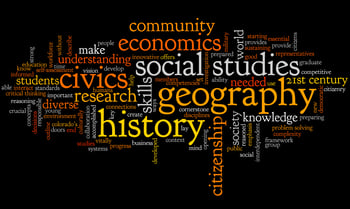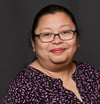 By Melissa Cardenas-Dow and Raymond Pun
By Melissa Cardenas-Dow and Raymond Pun
With a greater emphasis on data and numbers, the social sciences are becoming more interdisciplinary-based, with an increased focus on research methods and data collection plans. But what does that mean for instruction librarians supporting these research areas? The social sciences include fields like history, psychology, sociology, anthropology, ethnic studies, women’s studies, geography, political science, economics, and more. In this interview, social sciences librarian Melissa Cardenas-Dow shares her approach to teaching information literacy, and recommends selected sources to tap into the interdisciplinary nature of the social sciences.
Ray: Thanks for speaking with us! Can you tell us about your role as an instruction librarian and how you tailor information literacy for students in the social sciences?
Melissa: In my library instruction sessions and workshops, I emphasize the cultural and discursive aspects of scholarly communication. I use the metaphor of translation to frame research questions and key word development, and using these to get at subject and descriptor terms used to index information resources in online databases. I also use the idea of knowing one’s information environment, of which the library and online databases are just a part.
Ray: What are some challenges you face when supporting information literacy for the social sciences?
Melissa: I do think the challenges are many, so I’m just going to talk about the ones that I’ve been turning over in my head lately: making detail-oriented, undramatic processes enticing and interesting to minds that aren’t interested in this stuff. I find this challenge more prevalent in lower division courses than upper division, and not just limited to social sciences courses. I see the challenges in basically two parts, especially in trying to engage students new to the higher education academic setting.
The first part of the challenge is making the material exciting and interesting, even entertaining. I’m very well aware that searching for information for academic purposes is not the most riveting subject in the world. While sifting through data, interfaces, and all sorts of different information sources to fashion a coherent academic project is, I think, fun, creative, and exciting, I know that many others don’t agree. The second part is the all-too-common apathetic stance that many students have. I think it affects motivation and persistence necessary to do well academically. As an instructor, I think addressing student apathy toward their studies and the material I am offering is integral. I often struggle with this and strive to grow my teaching repertoire with active learning techniques and tools.
Specifically for social sciences, helping students become aware of differing disciplinary discourse conventions is key. How to go about answering a research question can change, depending on the discipline involved. That can be a great challenge too, since many interesting questions are interdisciplinary in nature.
Ray: I appreciate you taking the time to reflect and share your thoughts on library instruction in the social sciences and teaching in general. Do you recommend any resources instruction librarians should consider when thinking about fields like psychology, ethnic studies, women's studies, and family & consumer sciences?
Melissa: Before I dive in to this question, I have to say that I don’t consider myself a true expert in social sciences and I have much to learn. Given this, I find the instructional videos from PsycINFO to be extremely helpful. They are available on YouTube. Having said all of this now, I should also restate that so much of the research work done in women’s studies, ethnic studies, and family & consumer sciences can be interdisciplinary, so considering the disciplinary domains touched by a research question is important. So far, I’ve found using PsycINFO as a starting point to look up scholarly research relevant to women’s studies, ethnic studies, and family & consumer sciences, especially if they focus on psychosocial processes, to be helpful.
Moreover, the search fields offered in PsycINFO allow for the teaching of various aspects of research articles that are highly and likely relevant to the research question at hand—methodology, publication status, age group, population group. As research questions tend to beget more questions, it’s important to think of various approaches to the original question. I often ask myself if a legal or medical angle are fruitful. Or what sorts of adjacent concepts and theoretical perspectives are there. Since many of the students I engage with are concerned about the application of psychology’s perspectives and principles, we often delve into scholarly and professional literature in social work, education, and counseling. And PsycINFO is still the database we use to find these items.
 Melissa Cardenas-Dow is a social sciences librarian at Sacramento State University. She is currently a co-chair of the ALA Equity, Diversity & Inclusion Implementation Working Group, a member of the ALA Nominating Committee, and a Councilor-at-Large. Most recently, she worked with the Joint Conference of Librarians of Color (JCLC) as the Graphics Design Coordinator within the JCLC 2018 Public Relations Committee.
Melissa Cardenas-Dow is a social sciences librarian at Sacramento State University. She is currently a co-chair of the ALA Equity, Diversity & Inclusion Implementation Working Group, a member of the ALA Nominating Committee, and a Councilor-at-Large. Most recently, she worked with the Joint Conference of Librarians of Color (JCLC) as the Graphics Design Coordinator within the JCLC 2018 Public Relations Committee.

/CTA%20Images/CORSfooter.jpg?width=600&name=CORSfooter.jpg)